

HarpersMagazine-1998-01-0059425. 21 Tips for Clients in Psychotherapy. 10 Examples of Walking Privilege That All Walking People Should Acknowledge. When we talk about privilege, we talk about male privilege, white privilege, class privilege, and straight privilege.
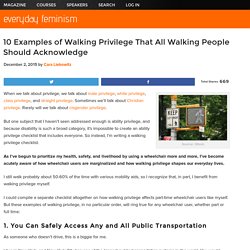
Sometimes we’ll talk about Christian privilege. Rarely will we talk about cisgender privilege. But one subject that I haven’t seen addressed enough is ability privilege, and because disability is such a broad category, it’s impossible to create an ability privilege checklist that includes everyone. So instead, I’m writing a walking privilege checklist. As I’ve begun to prioritize my health, safety, and livelihood by using a wheelchair more and more, I’ve become acutely aware of how wheelchair users are marginalized and how walking privilege shapes our everyday lives.
I still walk probably about 50-60% of the time with various mobility aids, so I recognize that, in part, I benefit from walking privilege myself. I could compile a separate checklist altogether on how walking privilege affects part-time wheelchair users like myself. 1. “But wait!” Washington's Horrible Mental Health Legislation There is no question that America's mental health care system is in dire need of an overhaul.

But the "Helping Families in Mental Health Crisis Act" (H.R. 2646), introduced by Congressman Tim Murphy (R-PA), represents the worst, most regressive possible direction for reform. Its passing would mean the erosion of key civil and health privacy rights for people living with psychiatric disabilities, and an increase in punitive, institutional approaches to care. The bill does little to encourage the implementation of the evidence-based supports that allow many people to live successfully in the community -- including supported housing, case management, rehabilitation services, job training and placement, and peer supports. H.R. 2646 passed out of the Energy and Commerce Health Subcommittee earlier this month after a marathon ten-hour markup process. When People Say I’m Being a Victim for Experiencing My Mental Illness. I have a mental illness.
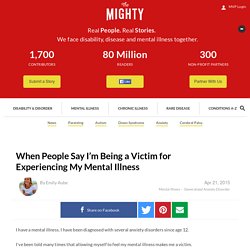
I have been diagnosed with several anxiety disorders since age 12. I’ve been told many times that allowing myself to feel my mental illness makes me a victim. I’ve never felt sorry for myself, per se. I don’t think there is any point in feeling this way because it just makes things significantly more painful. But I do want to speak out on something that is important to me. I think nervousness is sometimes associated with anxiety disorder, and the two are vastly different. Anxiety is complex. There are various categories of anxiety.
TEN ACCESS BLUNDERS THAT THE NONDISABLED MAKE. By: Emily Beitiks Well, it happened again.
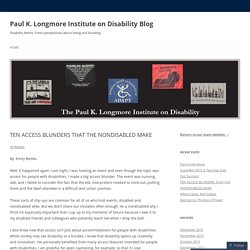
Last night, I was hosting an event and even though the topic was access for people with disabilities, I made a big access blunder. The event was running late, and I failed to consider the fact that the ASL interpreters needed to clock out, putting them and the Deaf attendee in a difficult and unfair position. These sorts of slip-ups are common for all of us who host events, disabled and nondisabled alike.
Ableism Online: Virtually Passing While Disabled. Among people in marginalized communities, you’ll often hear talk of “passing.”
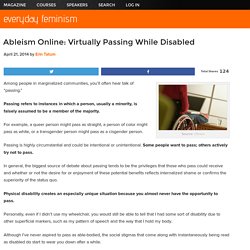
Passing refers to instances in which a person, usually a minority, is falsely assumed to be a member of the majority. For example, a queer person might pass as straight, a person of color might pass as white, or a transgender person might pass as a cisgender person. Passing is highly circumstantial and could be intentional or unintentional.
5 Things to Do (And Not Do) to Support Someone With Depression. The Neurotypicals’ Guide to Adults with Sensory Processing Disorder. Originally published on The Body Is Not an Apology and the author’s blog Coming to My Senses and republished here with their permission.
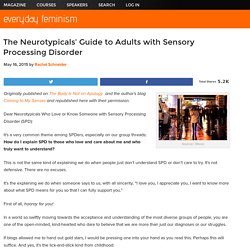
Dear Neurotypicals Who Love or Know Someone with Sensory Processing Disorder (SPD): It’s a very common theme among SPDers, especially on our group threads: How do I explain SPD to those who love and care about me and who truly want to understand? This is not the same kind of explaining we do when people just don’t understand SPD or don’t care to try. It’s not defensive. There are no excuses. It’s the explaining we do when someone says to us, with all sincerity, “I love you, I appreciate you, I want to know more about what SPD means for you so that I can fully support you.” First of all, hooray for you! In a world so swiftly moving towards the acceptance and understanding of the most diverse groups of people, you are one of the open-minded, kind-hearted who dare to believe that we are more than just our diagnoses or our struggles. 1. 7 Ways to Actively Support Suicide Attempt Survivors. Content warning: references to suicide and suicide attempts.
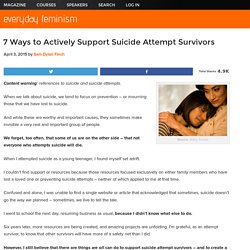
When we talk about suicide, we tend to focus on prevention – or mourning those that we have lost to suicide. And while these are worthy and important causes, they sometimes make invisible a very real and important group of people. We forget, too often, that some of us are on the other side – that not everyone who attempts suicide will die. When I attempted suicide as a young teenager, I found myself set adrift. I couldn’t find support or resources because those resources focused exclusively on either family members who have lost a loved one or preventing suicide attempts – neither of which applied to me at that time. 9 Affirmations You Deserve to Receive If You Have a Mental Illness. Saw you wanted so non-ableist terms! Hope this...